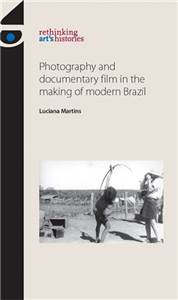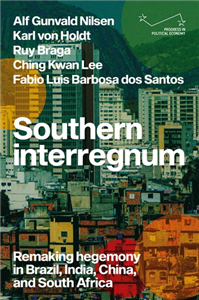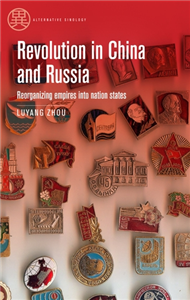Your Search Results
-
Editora do Brasil
Founded in 1943, Editora do Brasil has a wonderful history of commitment to culture and education. As a solid and experienced publisher, we are increasingly connected to the new times. One of the largest Brazilian companies in the segment, we believe in strengthening education and culture nationally and abroad. With a diverse and award-winning catalog, Editora do Brasil is always seeking to stay current and offer the best material. Our books feature a variety of themes by some of the best authors and designers, some of whom are internationally renowned.
View Rights Portal
-
Promoted Content
-
Promoted ContentHumanities & Social Sciences
Brazil in the world
The international relations of a South American giant
by Dr. Sean W. Burgess
Brazil has suddenly become a country of interest to the West, playing a critical role in global economic talks at the G20 and WTO, brokering North-South relations through its new international economic geography, and stepping into regional and global security questions through its activities in Haiti, Paraguay and the nuclear question in Iran. This book explains why Brazil is taking an increasingly prominent international role, how it conducts and plans its regional and global interactions, and what the South American giant intends to do with its rising international influence. The book is written for the non-specialist, providing students and other interested readers with a well-organized, concise introduction to the fundamentals of the foreign policy of an emerging Twenty-First Century power.
-
 Trusted Partner
The ArtsJanuary 2019
Trusted Partner
The ArtsJanuary 2019Popular cinema in Brazil, 1930–2001
by Stephanie Dennison, Lisa Shaw
Brazil has one of the most significant and productive film industries in Latin America. This ground-breaking study provides an entertaining insight into the Brazilian films that have most captured the imagination of domestic audiences over the years. The recent international success of films such as Central Station and City of God, has stimulated widespread interest in Brazilian film, but studies written in English focus on the 'auteur' cinema of the 1960s. This book focuses on individual films in their socio-historical context, drawing on extensive fieldwork in Brazil and Latin America. It argues that Brazilian cinema has almost always been grounded in intrinsically home-grown cultural forms, dating back to the nineteenth century, such as the Brazilian music-hall, the travelling circus, radio shows, carnival, and, later, comedy television. Combining a chronological structure with groundbreaking research and a lively approach, Popular cinema in Brazil is the ideal introduction to Brazilian cinema.
-
 Trusted Partner
Teaching, Language & ReferenceFebruary 2012
Trusted Partner
Teaching, Language & ReferenceFebruary 2012Workers, state and development in Brazil
Powers of labour, chains of value
by Benjamin Selwyn
How do changing class relations contribute to processes of capitalist development? Within development studies the importance of class relations is usually relegated to lesser status than the roles of states and markets in generating and allocating resources. This book argues that the changing class relations are central to different patterns of capitalist development and that processes and outcomes of class struggle co-determine the form that development takes. Workers, State and Development in Brazil, nominated for the International Political Economy Group (IPGG) Book Prize 2013 and now available in paperback, illuminates these claims through a detailed empirical investigation of class dynamics and capitalist development in North East Brazil's São Francisco valley. It details how workers in the valley's export grape sector have won significant concessions from employers, contributing to a progressive pattern of regional capitalist development. The book will appeal to students and researchers interested in processes of capitalist development, agrarian political economy and international political economy. ;
-
 Trusted Partner
The ArtsOctober 2013
Trusted Partner
The ArtsOctober 2013Photography and documentary film in the making of modern Brazil
by Luciana Martins, Amelia Jones, Marsha Meskimmon
Photography and documentary film in the making of modern Brazil provides a major contribution to the field of visual culture through a study of still and moving images of Brazil in the first four decades of the twentieth century, when the camera played a key role in making Brazilian peoples and places visible to a variety of audiences. The book explores what is distinctive about the visual representation of Brazil in an era of modernisation, also attending to the significance of the different technical properties of film and photography for the writing of new histories of visual technologies. It offers new insights into the work of key writers, photographers, anthropologists and filmmakers, including Claude Lévi-Strauss, Mário de Andrade, Silvino Santos and Aloha Baker. Unearthing a wealth of materials from archives in the USA, Britain, and Brazil, the book seeks to contribute to the postcolonial theoretical project of pinpointing locally distinctive histories of visual technologies and practices. ;
-
 Trusted Partner
Business, Economics & LawJune 2025
Trusted Partner
Business, Economics & LawJune 2025Southern interregnum
Remaking hegemony in Brazil, India, China, and South Africa
by Alf Gunvald Nilsen, Karl von Holdt, Ruy Braga, Ching Kwan Lee, Fabio Luis Barbosa dos Santos
How do governing elites in the global South attempt to remake hegemony in a conjuncture of durable crisis? This is the question at the core of Southern interregnum, a comparative conjunctural analysis of hegemonic projects in Brazil, India, China, and South Africa. Working with a Gramscian notion of crisis, centred on the interregnum as an enduring period of instability and uncertainty, in which hegemonic authority erodes and competing projects for crisis resolution emerge, the book proposes a novel critical reading of the convulsions that are currently reshaping the political economy of the global South and the world-system. Mapping the variegated trajectories of elite projects to reconcile accumulation and legitimation - and probing the limits of these projects - the book breaks new ground in the study of the contemporary global South.
-
 Trusted Partner
Humanities & Social SciencesJune 2025
Trusted Partner
Humanities & Social SciencesJune 2025Revolution in China and Russia
Reorganizing empires into nation states
by Luyang Zhou
Most scholars believe that China's nationality policy, like that of other socialist states, imitated the Soviet nationality model, a system which has been termed an "affirmative action empire." This book offers two contributions to the literature which run counter to this convention. First, it argues that the People's Republic of China (PRC) and the Soviet Union (USSR) were different; while the PRC was aimed to build an ideal-typical nation-state, the USSR was an open union of nation-states that was only temporarily confined to a physical territory. Second, while scholars who have noted this difference attribute it to contextual factors, such as ethnic structure, geopolitical status, and Russia's intervention into the Chinese Revolution, this book contends that context shaped the Sino-Soviet difference, yet it did not determine it. Rather, there was significant leeway between the implications of the contextual factors, and what the policy-designers ultimately established. This book probes who held agency, and how these individuals bridged this gap.
-
 Trusted Partner
2024
Trusted Partner
2024Where is Russia Heading?
by Jens Siegert
Vladimir Putin has been ruling Russia for 25 years. There is no end in sight to his dictatorship. He relies on repression at home and is waging a war of destruction against a neighbouring country. The conflict with the West has long become a systemic conflict between an illiberal-autocratic ideology and liberal-democratic principles. Nothing will change as long as Putin remains in power. Nevertheless, as far as can be ascertained under unfree conditions, the majority of the population seems to be supporting Putin. Does this mean that too many people in Russia do not want democracy or peace? Will everything remain the same after Putin? Or is there a chance that Russia will eventually take a different, more democratic path? Whatever the outcome of the war in Ukraine, Russia is not going to disappear. We will still have to deal with our big neighbour in the east. This makes it all the more important to focus on longer-term developments. As a recognised expert on Russian history and society, the author outlines what the post-Putin era might look like. His in-depth analysis makes it clear that Russia is partly Putin, but Putin is not everything about Russia.
-
 Trusted Partner
Humanities & Social SciencesOctober 2022
Trusted Partner
Humanities & Social SciencesOctober 2022Germany's Russia problem
The struggle for balance in Europe
by John Lough
The relationship between Germany and Russia is Europe's most important link with the largest country on the continent. But despite Germany's unparalleled knowledge and historical experience, its policymakers struggle to accept that Moscow's efforts to rebalance Europe at the cost of the cohesion of the EU and NATO are an attack on Germany's core interests. This book explains the scale of the challenge facing Germany in managing relations with a changing Russia. It analyses how successive German governments from 1991 to 2014 misread Russian intentions, until Angela Merkel sharply recalibrated German and EU policy towards Moscow. The book also examines what lies behind efforts to revise Merkel's bold policy shift, including attitudes inherited from the GDR and the role of Russian influence channels in Germany.
-
 Trusted Partner
November 1988
Trusted Partner
November 1988Über Deutschland reden
by Martin Walser
Seit zehn Jahren beschäftigt sich Martin Waiser mit einem Thema, das in der öffentlichen Meinung, bei den Politikern und bei den Intellektuellen als obsolet gilt: Deutschland. Und er beharrt darauf, daß das Wort Deutschland nicht nur im Wetterbericht Verwendung findet. Für Waiser bezeichnet dieses Wort vielmehr ein Fehlendes, das nicht dadurch einfach zu beseitigen ist, daß man es als geschichtlich notwendig ansieht, als verdientes, zu bejahendes Resultat der Geschichte. Eine solche Auffasssung ist für Waiser gerade unhistorisch - versperrt sie doch von vornherein die Möglichkeiten jedweden historischen Prozesses.
-
 Trusted Partner
July 2018
Trusted Partner
July 2018Deutschland und Israel
by Amos Oz, Lydia Böhmer, Norbert Lammert
Als Kind im Jerusalem der 40er Jahre erlebt Amos Oz den Hass auf Deutschland als etwas Absolutes, Unverrückbares. Die Deutschen sind Mörder, ihre Sprache, ihre Produkte geächtet, das Wiedergutmachungsabkommen von 1952 noch als Schande verschrien. Und in jedem Pass des jungen Landes steht "Gültig für alle Länder – mit Ausnahme von Deutschland". Doch dann sind da die Bücher, die Literatur, dann liest er und das ganze Land Lenz, Böll, Grass, und ein Wandel vollzieht sich, im Kleinen wie im Großen, in ihm wie im Staate Israel … Amos Oz kombiniert persönliche Erfahrungen mit historisch-politischem Nachdenken. Auf diese Weise liefert er eine beeindruckende Bestandsaufnahme des alles andere als normalen Verhältnisses zweier Nationen. Ein Buch über Deutschland, über Israel, über den mehr als sechzig Jahre währenden Prozess der Verständigung. Und zur gleichen Zeit ein Plädoyer für die brückenschlagende Kraft des Erzählens.
-
 Trusted Partner
Humanities & Social SciencesFebruary 2026
Trusted Partner
Humanities & Social SciencesFebruary 2026AIDS in Soviet Russia
A story of deception, despair and hope
by Rustam Alexander
The first book to tell the shocking story of the AIDS crisis in Soviet Russia. Throughout the 1980s, as the world was grappling with the escalating crisis of AIDS, Soviet Russia continued to deny there was a problem. Arguing that the disease was limited to foreigners and 'immoral' groups, the government failed to take meaningful action, long past the point other countries had begun to recognise the full scale of the threat. In this ground-breaking book, Rustam Alexander tells the story of AIDS in Soviet Russia. Fixated on disinformation, censorship and the persecution of marginalised communities, the Soviet authorities wasted precious time, allowing the epidemic to strike at the very heart of the nation: its children. Yet, despite the government's failure, a number of brave journalists, doctors and nascent gay groups decided to take matters into their own hands and engage in full-fledged AIDS activism. Tracing the political and social response to AIDS in the final years of the Soviet era, Alexander sheds light on the devastating consequences of government inaction. He draws on personal stories, media reports and archival materials to provide a riveting account of the Russian people's fight against AIDS amid the tumultuous transformations of Gorbachev's perestroika.
-
 Trusted Partner
February 1992
Trusted Partner
February 1992Über Juden in Deutschland
by Gert Mattenklott
Der Schriftsteller und Literaturwissenschaftler Gert Mattenklott schaut hinter die großen Linien historischer Darstellung, fragt nach dem Innenleben, den Erfahrungen von Juden in Deutschland. Hier ist der Plural genau zu nehmen: Mattenklott zeichnet eine Vielzahl jüdischer Lebensgeschichten nach, die alle zu der einen Geschichte von Juden in Deutschland und zu deren tiefem Einschnitt nach 1933, der Entrechtung, Vertreibung und dem Völkermord, gehören. Am Leitfaden von Korrespondenzen zeichnet Gert Mattenklott nach, wie sich jüdisches Bewußtsein äußert. Das Spektrum reicht von unbekannten Kaufleuten der frühen Neuzeit bis zu den großen Briefschreibern des 19. und 20. Jahrhunderts. Die Gegenwart ist nicht durch Briefe, sondern durch Gespräche dargestellt, die Gert Mattenklott geführt hat.
-
 Trusted Partner
Trusted Partner
-
 Trusted Partner
December 1995
Trusted Partner
December 1995Das nationalsozialistische Deutschland
1933–1945. Die Entfesselung der Gewalt: Rassismus und Krieg
by Ludolf Herbst, Hans-Ulrich Wehler
Das vorliegende Buch von Ludolf Herbst macht es sich zur Aufgabe, diese Prozesse zu untersuchen. Dabei stehen Krieg und Rassenpolitik im Mittelpunkt. Sie werden jedoch nicht isoliert betrachtet, sondern mit wesentlichen innenpolitischen und gesellschaftlichen Entwicklungen verknüpft. Dies geschieht in der Annahme, daß die außerordentliche Dynamik, mit der das nationalsozialistische Deutschland in der Außen- und Rassepolitik agierte, wesentlich von diesen korrespondierenden Bereichen mitgeprägt wurde.
-
 Trusted Partner
Trusted Partner
-
 Trusted Partner
Society & culture: general
Trusted Partner
Society & culture: generalA TIME OF WOLVES: GERMANY AND THE GERMANS 1945 - 1955
by Harald Jähner
A dance among the ruins: Harald Jähner’s major new portrait of Germany’s post-war societyCountless former soldiers drift through the towns and cities; countless children grow up without a father. The old order has been destroyed and although the streets seem eerily empty, the traditional annual street carnivals are soon back in full swing, jazz can be heard among the ruins, intellectuals rekindle a culture of discussion and debate.Harald Jähner’s book is the first history of Germany’s national mentality in the immediate post-war period. It focusses on the German people in all their diversity: the “re-educators” Alfred Döblin and Rudolf Herrnstadt, who tried in two different zones of occupation to win the trust of their fellow Germans; Beate Uhse, owner of a mail order company for “marital hygiene”, who questioned the old moral code governing what was deemed proper; the many nameless black market traders, pockets stuffed with Lucky Strike cigarettes; stylish housewives sitting at kidney-shaped coffee tables that were to become emblematic for a freer and affordable world. Using major political developments as a backdrop, this book weaves a series of life stories into a nuanced panorama that makes the monumental changes affecting the nation tangible for its readers. 1945 to 1955 was a raw, wild decade poised between two eras, portrayed here as a period that proved decisive for Germany’s future development – and one starkly different to how most Germans imagine it today.
-
 Trusted Partner
September 2022
Trusted Partner
September 2022Right-Wing Judges in Germany
AfD judges, prosecutors and jurors: a danger to democracy?
by Joachim Wagner
— How politics are increasingly influencing the rule of law in Germany — Systematic failures of democracy to protect itself — Based on numerous interviews with different members of Germany's legal system Ever since the right-wing party “Alternative for Germany” (AfD) secured representation in the Bundestag and in all state parliaments, Germany’s judiciary is facing a new challenge for which it is unprepared: AfD-affiliated judges and public prosecutors are attracting attention through right-wing biased decisions and investigations. Other members of the legal system cause further damage by ignoring the right-wing extremist and anti-Semitic background of crimes and thus punishing offenders too leniently or not at all. Both the judiciary and policy-makers have so far underestimated the new danger from the right. As a result protection against the appointment of right-wing legal professionals has been insufficient. Joachim Wagner systematically analyses numerous examples from German courts in recent years. He calls on the democratic judiciary to remember the principles of a well-fortified democracy.
-
 Trusted Partner
Trusted Partner
-
 Trusted Partner
Literature & Literary StudiesJanuary 2013
Trusted Partner
Literature & Literary StudiesJanuary 2013Eleventh-century Germany
The Swabian chronicles
by I. Robinson
Three of the most important chronicles of eleventh-century Germany were composed in the south-western duchy of Swabia. The chronicles reveal how between 1049 and 1100 the centripetal attraction of the reform papacy became the dominant fact of intellectual life in German reformed monastic circles. In the abbey of Reichenau Herman 'the Lame' composed a chronicle of the reign of Emperor Henry III (1039-56). His pupil, Berthold of Reichenau, continued his master's work, composing a detailed account of 1076-1079 in Germany. Bernold, a clergyman of Constance, continued the work of Herman and Berthold in a text containing the fullest extant account of 1080-1100. Herman's waning enthusiasm for the monarchy and growing interest in the newly reformed papacy were intensified in Berthold's chronicle, and writing in the new context of the reformed monasteries of south-western Germany, Bernold preached total obedience to the Gregorian papacy. The Swabian chronicles are an indispensable resource to the student of the changing loyalties and conflicts of eleventh-century Germany.





























